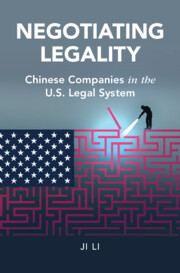Book contents
- Negotiating Legality
- Cambridge Studies in Law and Society
- Negotiating Legality
- Copyright page
- Dedication
- Contents
- Figures
- Tables
- Acknowledgments
- Introduction
- Chapter One Chinese Companies in the US Legal System
- Chapter Two In-House Legal Managers of Chinese Companies in the United States
- Chapter Three Chinese Companies and Their US Lawyers
- Chapter Four US Litigation by Chinese Companies
- Chapter Five Chinese Companies in US Federal Courts
- Chapter Six Chinese Companies’ Legal Strategies against US Government Mistreatment
- Conclusion
- Index
- Cambridge Studies in Law and Society
Chapter Four - US Litigation by Chinese Companies
Published online by Cambridge University Press: 13 June 2024
- Negotiating Legality
- Cambridge Studies in Law and Society
- Negotiating Legality
- Copyright page
- Dedication
- Contents
- Figures
- Tables
- Acknowledgments
- Introduction
- Chapter One Chinese Companies in the US Legal System
- Chapter Two In-House Legal Managers of Chinese Companies in the United States
- Chapter Three Chinese Companies and Their US Lawyers
- Chapter Four US Litigation by Chinese Companies
- Chapter Five Chinese Companies in US Federal Courts
- Chapter Six Chinese Companies’ Legal Strategies against US Government Mistreatment
- Conclusion
- Index
- Cambridge Studies in Law and Society
Summary
To litigate or not to litigate, that is the question any Chinese companies operating in the United States long enough must contemplate. For American companies, litigation is nothing but an unavoidable business risk and often a vital competition strategy, routinely dealt with by legal and managerial professionals applying monetarized cost–benefit analysis. Such analysis typically incorporates attorney fees and other litigation expenses, potential reputational damage, time and human resource consumption, and the present value of expected litigation gains or losses. By contrast, litigation in China carries complex social meanings and is often avoided to preserve long-term cooperative relationships or to signal desirable attributes to uninformed third parties. When lawsuits do occur, they are often handled by stakeholders without professional legal assistance. Disputants consider a wide range of material and nonmaterial interests that are shaped by both formal institutions undergoing significant transformation and complex, entrenched social norms governing dispute resolution. Chinese companies immersed in these two disparate institutional environments approach legal disputes in the United States.
Keywords
- Type
- Chapter
- Information
- Negotiating LegalityChinese Companies in the US Legal System, pp. 124 - 158Publisher: Cambridge University PressPrint publication year: 2024

